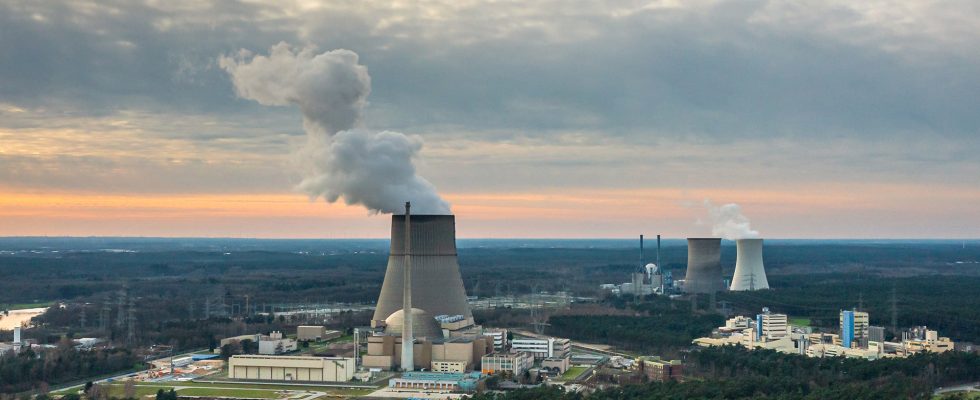As of: 04/15/2023 5:24 p.m
Shortly before midnight, the last three nuclear reactors will finally go offline – months later than originally planned by the black-yellow coalition at the time. Opponents of nuclear power are celebrating the end of an era.
After around six decades, Germany is saying goodbye to nuclear power today – the nuclear power plants Isar 2 in Bavaria, Emsland in Lower Saxony and Neckarwestheim 2 in Baden-Württemberg are scheduled to go offline late in the evening. The last plant is expected to shut down shortly before midnight.
For opponents of nuclear power, this is a reason to celebrate: according to the BUND, more than 2,300 people came together at the Odeonsplatz in Munich, at the nuclear power plant in Neckarwestheim and at the fuel element factory in Lingen; There were also actions in Hamburg, Hanover and Freiburg. According to BUND, the participants also wanted to set a “sign for the final phase-out of nuclear power”.
“This is a historic moment here”, Alice Robra, SWR, at the nuclear power plant in Neckarwestheim (Baden-Württemberg)
tagesschau24 2 p.m., April 15, 2023
According to Greenpeace, 200 to 300 opponents of nuclear power gathered at the Brandenburg Gate in Berlin, where the organization had set up a symbolically hunted down “Atomdino”. The head of Greenpeace Germany, Martin Kaiser, celebrated the shutdown of the last nuclear power plants in Germany as a “huge success” in 40 years of the anti-nuclear movement.
Actually, the nuclear power plants should have been taken off the grid at the end of last year. This was decided by the coalition of CDU/CSU and FDP in response to the Fukushima nuclear disaster. Because of the Russian war of aggression against Ukraine, however, the traffic light coalition decided last year to let the three reactors continue to run over the winter.
Debate about the continued operation of nuclear power plants continues to smolder
But even if the decision to shut down the nuclear reactors has long been politically sealed, the debate continues. Federal Environment Minister Steffi Lemke (Greens) told the dpa news agency that the nuclear phase-out would make Germany safer. “The risks of nuclear power are ultimately unmanageable in the event of an accident.” The SPD parliamentary group also wrote on Twitter: “Nuclear power? And bye”.
Greens Chairwoman Ricarda Lang said in the daily topicsthe phasing out of nuclear power stands for the entry into the age of renewable energies.
Ricarda Lang, Chairwoman of B. 90/Die Grünen, on the phase-out of nuclear power and the expansion of renewable energies
daily topics 10:15 p.m., 14.4.2023
Bavaria’s Prime Minister Markus Söder (CSU) had previously daily topics reiterated its demand to examine a return to the use of nuclear energy. “We need every scrap of energy.” FDP boss Lindner had told the television station Welt-TV on Friday evening that he wanted to leave the three nuclear power plants in reserve instead of dismantling them. In addition, Germany should “keep open the possibility of nuclear fusion, research here and also enable applications”.
Markus Söder, Prime Minister of Bavaria, on a possible return to nuclear power
daily topics 10:15 p.m., 14.4.2023
Shut down just before midnight
The shutdown of the last nuclear power plant is expected shortly before midnight – it is unclear which of the three reactors will be the last. According to the operator PreussenElektra, the Isar 2 nuclear power plant is expected to go offline around 11:45 p.m. and thus no longer feed in electricity. About a quarter of an hour later, the reactor will be shut down, said plant manager Carsten Müller. “We comply with the Atomic Energy Act by disconnecting the generator from the grid before midnight.”
After shutdown, the reactor will “run cold”. According to Müller, the temperature in the system is reduced to ambient temperature within around twelve hours. About nine hours after the shutdown, steam will no longer be visible above the cooling tower.

